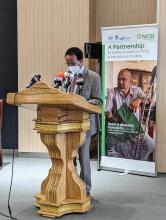Gambia Unveils Pioneering Strategy to Confront Escalating Non-Communicable Diseases Crisis
Banjul, The Gambia - In a highly publicized and momentous event, His Excellency President Adama Barrow officially introduced The Gambia's groundbreaking "National Multi-Sectoral Strategy and Costed Action Plan" to combat the rising threat of non-communicable diseases (NCDs). Developed through collaboration with prominent health partners, including the World Health Organization (WHO) and the Defeat NCD Partnership, the five-year plan is poised to reshape the nation's response to the mounting challenges posed by NCDs on the country's healthcare infrastructure.
President Barrow, addressing the nation, illuminated the staggering global and local impact of NCDs. A staggering 34% of registered deaths in The Gambia are attributed to NCDs, mirroring a global scenario where these diseases claim 71% of lives annually. The President emphasized the imperative for collective action to address this pressing public health concern. In a resounding address, WHO Representative Dr. Desta Tiruneh stressed the necessity for a collaborative, multi-sectoral approach to realize the objectives outlined in the action plan. Commending President Barrow for his unwavering commitment, Dr. Tiruneh called for unity among citizens to surmount the challenges posed by NCDs. The collaborative ethos resonated throughout the event, with Health Minister Hon. Dr. Ahmadou Lamin Samateh acknowledging the relentless efforts of WHO, the Defeat NCD Partnership, and other health partners. He expressed gratitude for their instrumental role in formulating the meticulously crafted action plan and sought their continued collaboration for the realization of its ambitious goals.
This landmark initiative builds upon The Gambia's previous endeavors in the battle against NCDs, with WHO emerging as a pivotal ally. The organization has played a vital role in supporting multifaceted measures, including the formulation of the Tobacco Control Act, which not only bolstered government revenue but also curtailed the importation and use of tobacco products. WHO's involvement extended to crafting a comprehensive five-year work plan for the National Tobacco Control Committee, further operationalizing the Tobacco Control Action Plan.
Following The Gambia's inclusion in the WHO's 2018 Global Alcohol Status Report for the highest years of life lost due to excessive alcohol consumption, the WHO Gambia team orchestrated a collaborative effort with the International Organization of Good Templars. This resulted in securing funds from the West Africa Alcohol Alliance, enabling the development and validation of a forward-looking National Alcohol Policy (2021-2026). The policy is anticipated to significantly mitigate alcohol-related challenges in the nation.
Additionally, WHO Gambia has meticulously tailored the WHO Package of Essential Noncommunicable Disease Interventions (WHO-PEN) to amplify the coverage of NCD services in primary care settings. Technical support has been extended to the Ministry of Transport in the formulation of the "Road Safety Strategy" to address the alarming prevalence of road-related accidents—a leading cause of death and disability among Gambians aged 5-49.
The launch of this sweeping strategy marks a significant milestone in The Gambia's proactive stance against NCDs, symbolizing a nation committed to prioritizing public health and fortifying its healthcare landscape against emerging threats.





